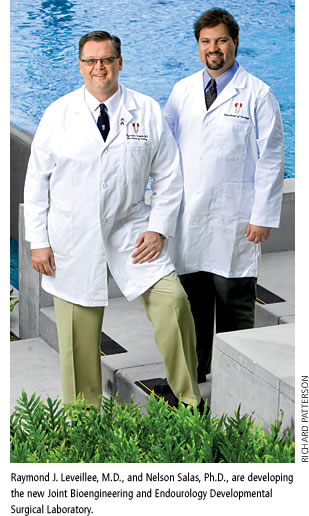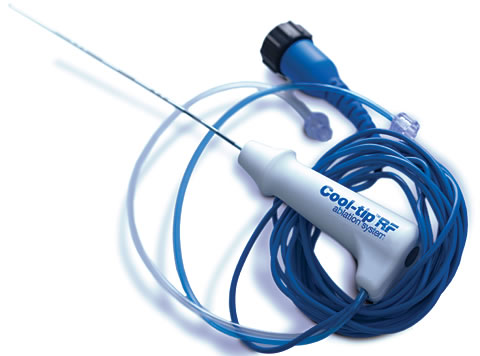 In addition to being one of the Miller School’s top urologic surgeons, Raymond J. Leveillee, M.D., is an inveterate tinkerer. When he’s not seeing patients, Leveillee loves to modify some of the surgical equipment he works with to further enhance its effectiveness. In addition to being one of the Miller School’s top urologic surgeons, Raymond J. Leveillee, M.D., is an inveterate tinkerer. When he’s not seeing patients, Leveillee loves to modify some of the surgical equipment he works with to further enhance its effectiveness.
That’s because Leveillee, who’s chief of the Division of Endourology, Laparoscopy and Minimally Invasive Surgery in the Department of Urology, is driven to find new ways to fully optimize patient outcomes.
His penchant recently paid handsome dividends—in the form of public praise from a well-known patient, as well as an anonymous $1.5 million gift that created a new laboratory to devise medical technology innovations.
It was one such innovation that helped Leveillee excise a cancerous tumor embedded in the left kidney of Florida State Senator Steven A. Geller. Leveillee, who’s a member of the Prostate, Bladder and Kidney Site Disease Group at Sylvester Comprehensive Cancer Center, destroyed Geller’s malignancy using a technique known as radio frequency ablation (RFA).

Radio frequency ablation involves the insertion of an eight-inch needle carrying electrical current to obliterate cancerous masses by heating them to about 140 degrees Fahrenheit. An RFA-fiber optic thermometer Leveillee developed made it possible for him to use RFA on Geller’s tumor, which was in a location that was difficult to reach.
After Geller was anesthetized and placed in a CT scanner, Leveillee worked in conjunction with a radiologist to insert the RFA needle into the tumor.
Leveillee describes the technique as “a marriage of technology with surgical skills, using the CT scan as an extension of my hands.” He co-authored two assessments of the RFA procedure for the Journal of Endourology.
“It’s miraculous,” is how Geller characterizes Leveillee’s surgery, which was performed on an outpatient basis. “With this procedure, I was in and out on a Wednesday and back at work the following Monday. A more conventional surgery would have hospitalized me six to eight days and left me facing four to six weeks of recuperation after my discharge.
“When I woke up following Dr. Leveillee’s operation, I couldn’t even see the scar,” Geller marvels.
In June, six months after Geller’s surgery, he and Leveillee met at Sylvester for a post-op checkup that indicated Geller was cancer-free. The men also met with newspaper and television reporters to disclose the anonymous $1.5 million donation, which is enabling Leveillee to conduct additional RFA research.
“It came from a philanthropic family that knew I needed start-up funds so I could set up a lab at UM, instead of working on it during the weekends in my garage,” Leveillee says.
The donation made on Leveillee’s behalf led to the formation of the Joint Bioengineering and Endourology Developmental Surgical Laboratory. Leveillee is the lab’s director and Nelson Salas, Ph.D., from UM’s College of Engineering, is assistant director.
“The generous donor who reached out to Dr. Leveillee has facilitated a combined effort between medicine and engineering that will help refine tools needed by the physician,” Salas says. “Our partnership will help increase our understanding of thermal treatment of kidney tumors, so that the process becomes as safe and efficient as possible.”
|


